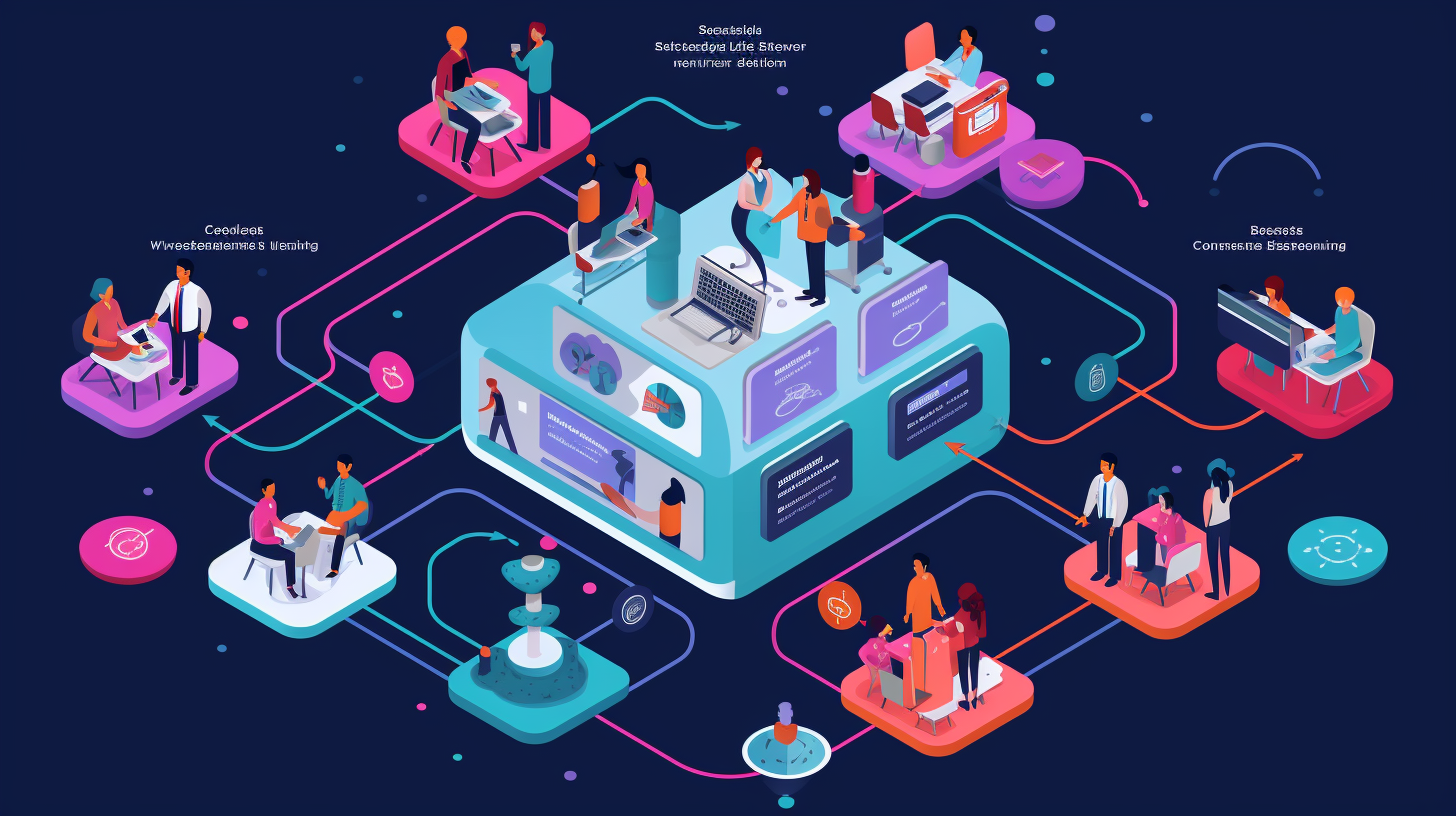In the ever-evolving world of technology, the importance of collaboration between development and operations teams cannot be overstated. As organizations strive to deliver high-quality software at a faster pace, there is a growing need to bridge the gap between these teams.
DevOps, SRE, and platform engineering are three roles that have emerged as key players in this process. While these roles have distinct responsibilities and priorities, there is also significant overlap between them, making collaboration and coordination essential for success.
Like pieces of a puzzle, these roles come together to form a cohesive and efficient system. DevOps focuses on the cultural and process changes needed to enable collaboration and automation between development and operations teams. SRE, on the other hand, is responsible for ensuring the reliability and scalability of systems by applying software engineering principles to infrastructure and operations. Platform engineering, meanwhile, builds and maintains the infrastructure needed to support software development and deployment.
By understanding the overlap between these roles, organizations can create a framework that optimizes their capabilities and resources, ultimately leading to better software delivery.

Defining DevOps, SRE, And Platform Engineering
Understanding the definitions and distinctions between DevOps, SRE, and Platform Engineering is crucial for organizations seeking to optimize their technology infrastructure and deliver high-quality software efficiently.
DevOps culture emphasizes collaboration and communication between the development team and operations teams to streamline delivery and increase efficiency. DevOps employs automation tools to standardize development and incorporates continuous delivery to reduce software bugs and vulnerabilities.
SRE applies software engineering principles to IT operations and focuses on service reliability and performance. SRE teams work to reduce system outages and downtime by addressing issues quickly and designing operable and reliable systems that are less likely to fail or experience unplanned downtime. SRE promotes efficient resource utilization and faster incident resolution, and it collaborates with DevOps teams to confirm issue resolution.
Platform Engineering focuses on infrastructure development and creates a self-service deployment platform for developers. Platform engineers design and maintain platforms that make the software-delivery pipeline efficient, stable, and consistent. Platform Engineering teams keep up with constantly evolving IT infrastructure and use automation tools to streamline processes and reduce errors. Platform Engineering enables developers to become self-reliant in dealing with software-delivery setups despite minimal knowledge of infrastructure deployment.

The Importance Of Collaboration In DevOps
Effective collaboration between development and operations teams is essential for the successful implementation of DevOps practices. The DevOps approach aims to break down silos and improve communication and collaboration between teams to accelerate product delivery and increase adaptability to market needs. Collaboration is not limited to just development and the operations team; it must also extend to other teams such as security, testing, and infrastructure engineering.
The DevOps team structure is typically a cross-functional team that includes developers, operations engineers, and other stakeholders. The team members are responsible for managing the entire software development life cycle, from development to deployment and maintenance. Collaboration between team members is achieved through automation tools, shared goals, metrics, and feedback loops. The DevOps team structure is flexible and can adapt to different project requirements, allowing for faster development cycles and better-quality software.

Ensuring Reliability And Scalability With SRE
Ensuring the reliability and scalability of IT systems is a critical aspect of modern cloud-native applications. Site reliability engineering (SRE) is an approach that applies software engineering principles to IT operations, with a focus on service reliability and performance. SRE teams work to minimize system downtime, prevent outages, and address issues quickly to ensure that services are always available to users.
To achieve reliability and scalability, SRE teams prioritize designing operable systems that are less likely to fail or experience unplanned downtime. They use automation tools to manage infrastructure as code, automate deployment processes, and monitor systems. SRE teams also define acceptable levels of availability and use metrics such as service level indicators (SLIs), service level objectives (SLOs), and service level agreements (SLAs) to measure system performance and reliability.
Collaboration with other teams, such as the platform engineering team, is also crucial to ensure reliability and scalability. Platform engineering focuses on building and maintaining the infrastructure that supports the software delivery pipeline. By working closely with platform engineering, SRE teams can ensure that the infrastructure is designed and maintained to meet the needs of the applications running on it.
Together, SRE and platform engineering teams can create a self-service deployment platform for developers, enabling them to become self-reliant in dealing with software-delivery setups despite minimal knowledge of infrastructure deployment.

Building Infrastructure With Platform Engineering
Platform engineering plays a crucial role in the development and maintenance of the infrastructure necessary for the efficient and reliable delivery of software applications. This role focuses on building and maintaining shared tools, servers, networks, and storage systems that are essential to the software delivery pipeline.
The platform engineering team works to keep up with constantly evolving IT infrastructure, using automation tools to streamline processes and reduce errors.
Cloud-native applications require a different approach to infrastructure development, and platform engineering teams must adapt to these changing requirements. Platform engineers design and maintain platforms that make the software-delivery pipeline efficient, stable, and consistent.
This work involves creating a self-service deployment platform for developers so that they can become self-reliant in dealing with software-delivery setups despite minimal knowledge of infrastructure deployment.
Platform engineering teams also work closely with SRE and DevOps teams to ensure the reliability and scalability of IT systems. By building infrastructure that is scalable, platform engineering can help the entire software development lifecycle process to run smoothly and efficiently.
In summary, platform engineering is a critical component of the software delivery pipeline and is necessary for the successful delivery of cloud-native applications.

Overlapping Roles And Responsibilities
Collaboration between different teams in technology organizations can create overlaps in roles and responsibilities. For example, a software engineer may take on some tasks traditionally assigned to a DevOps engineer, such as deploying code to production environments. Similarly, a member of an SRE team may assume some of the responsibilities of a platform engineer, such as managing infrastructure. These overlaps can be beneficial in promoting collaboration and cross-functional learning, but they can also lead to confusion and inefficiencies.
To prevent confusion and ensure efficient software delivery, it is important for teams to clearly define their roles and responsibilities. While there may be some overlap, each role should have its unique set of duties and expectations.
A DevOps engineer, for example, may focus on automation and streamlining the development process, while an SRE team may prioritize reliability and scalability. A platform engineer may manage infrastructure and prioritize self-service capabilities for developers.
Ultimately, the goal is to deliver high-quality software efficiently and reliably. This requires collaboration between different teams and roles, but also a clear understanding of each team’s responsibilities.
By working together and leveraging each other’s strengths, DevOps engineers, SRE teams, and platform engineers can create a seamless software delivery pipeline.

The Benefits Of Combining DevOps, SRE, And Platform Engineering
The integration of DevOps, SRE, and platform engineering can result in a highly efficient and reliable software delivery pipeline that meets the evolving needs of the business. By combining the strengths of each team, organizations can achieve faster time to market, improved collaboration, better quality, increased efficiency, and greater scalability.
DevOps teams focus on collaboration and automation to streamline development, while SRE teams focus on systems reliability and performance. Platform engineering teams focus on building and maintaining infrastructure to enable self-service deployment for developers.
Automation tools and continuous deployment are key components of this integration. DevOps teams use automation to streamline processes and reduce errors, while SRE teams use automation to manage infrastructure as code and automate deployment processes. Platform engineering teams use automation to make the software-delivery pipeline efficient, stable, and consistent.
With continuous deployment, changes can be made quickly and efficiently, reducing the time to market and improving the overall quality of the software.
The benefits of combining DevOps, SRE, and platform engineering are significant. By working together, these teams can ensure the reliability and scalability of IT systems, optimize systems to meet business needs, and deliver high-quality software faster. With a focus on automation, collaboration, and systems reliability, organizations can achieve their digital transformation goals and stay ahead of the competition.

Implementing DevOps, SRE, And Platform Engineering In Your Organisation
Implementing a successful integration of DevOps, SRE, and platform engineering in an organization requires a thorough understanding of the roles and responsibilities of each team and the tools and processes involved. A few key steps that can aid in this integration process include:
Establishing clear communication channels between teams and creating a culture of collaboration and shared responsibility.
Identifying areas where automation can be implemented to streamline processes and reduce errors, such as in testing, deployment, and monitoring.
Empowering platform engineers to create self-service deployment platforms and infrastructure as code to enable software developers to focus on building and delivering software.
Adopting DevOps practices, such as continuous integration and deployment, to accelerate time to market, improve collaboration, and increase efficiency.
Successful implementation of DevOps, SRE, and platform engineering can be a key factor in digital transformation success. By breaking down silos and promoting collaboration between teams, organizations can deliver high-quality software faster, with fewer errors and greater scalability.
Automation tools can further simplify and standardize processes, reducing the risk of human error and enabling teams to focus on innovation and growth. Overall, implementing DevOps, SRE, and platform engineering in an organization requires a holistic approach that considers the roles and responsibilities of each team, the tools and processes involved, and the overarching goals and objectives of the organization.
By prioritizing collaboration, automation, and innovation, organizations can create a culture of continuous improvement and achieve digital transformation success.

Common Challenges And How To Overcome Them
Despite the potential benefits of integrating DevOps, SRE, and platform engineering in an organization, there are common challenges that must be overcome to achieve success.
One of the main challenges is infrastructure issues, which can cause delays in development and deployment processes. To overcome this challenge, it is important for all teams to have a strong understanding of the infrastructure and to work collaboratively to identify and address any issues that arise.
Another challenge is organizational silos, which can lead to a lack of communication and collaboration between teams. This can result in delays, errors, and inefficiencies. To overcome this challenge, it is important to establish clear communication channels between teams and to encourage collaboration through shared goals and metrics. Additionally, change management processes should be established to ensure that all teams are aware of and involved in any changes that may impact the infrastructure.
It is important to ensure that all teams are following SRE practices to ensure the maximum reliability and scalability of IT systems. This includes monitoring systems, performing troubleshooting, and implementing automation. To overcome this challenge, it may be necessary to provide training and resources to all teams to ensure that they have a strong understanding of SRE principles and are able to apply them effectively. Additionally, it may be necessary to establish clear metrics and SLAs to measure performance and ensure that all teams are working towards the same goals.
Tools And Technologies For Successful Implementation
A variety of tools and technologies are available to enable developers support the successful implementation of DevOps, SRE, and platform engineering principles in organizations.
DevOps engineers can use automation tools such as Jenkins, GitLab, and Travis CI for continuous integration and delivery.
Site reliability engineers can utilize monitoring tools such as Prometheus, Grafana, and Nagios to measure service level objectives and service level agreements.
Platform engineering teams can leverage cloud-native tools such as Kubernetes, Terraform, and AWS CloudFormation to build and manage infrastructure as code.
Automation is a critical component of the successful implementation of DevOps, SRE, and platform engineering principles. Automation tools enable teams to reduce manual work and improve the consistency and reliability of deployments.
Continuous integration and delivery helps teams to ship code faster and more reliably. Site reliability engineers can use automation to triage and resolve incidents quickly, reducing downtime and improving service reliability.
Cloud-native tools such as Kubernetes, Terraform, and AWS CloudFormation are becoming increasingly important for organizations that are embracing cloud computing. These tools enable platform engineering teams to build and manage infrastructure as code, reducing manual work and improving the consistency and reliability of deployments.
DevOps engineers can use cloud-native tools to automate application deployment and scaling, reducing time to market and improving efficiency. Site reliability engineers can leverage cloud-native monitoring tools to measure service level objectives and agreements, enabling them to quickly identify and resolve incidents.
The Future Of DevOps, SRE, And Platform Engineering
The future of DevOps, SRE, and platform engineering is exciting as these concepts continue to evolve in the ever-changing landscape of technology. The adoption of cloud-native computing and digital transformation has made these roles more critical than ever before. The need for engineering teams that can work collaboratively to streamline delivery, improve reliability, and ensure security is paramount in today’s competitive market.
As organizations continue to embrace DevOps, SRE, and platform engineering, there will be a greater emphasis on automation, measurement, and sharing. The use of automation tools will become even more prevalent, streamlining processes and reducing errors. There will be a continued focus on improving collaboration between development and operations teams, breaking down silos, and reducing the software development life cycle (SDLC) for faster time to market.
The future of DevOps, SRE, and platform engineering is bright as organizations continue to embrace these concepts. The emphasis on automation, collaboration, and reducing the SDLC will be key to success. As technology continues to evolve, it will be essential to have the right people with the appropriate skill sets to ensure systems and software run smoothly and efficiently. By doing so, businesses can meet their needs and stay competitive in today’s market.
Conclusion
The roles of DevOps, SRE, and platform engineering are critical for organizations looking to improve the speed, quality, and reliability of their software. These roles have distinct responsibilities, but they also share an overlap in their focus on collaboration, automation, and infrastructure.
As organizations continue to adopt these roles, it is important to understand how they can work together to bridge the gap between the development teams and operations teams and overcome common challenges. One interesting statistic is that organizations that implement DevOps practices experience 60 times fewer failures and recover from failures 168 times faster than those that do not. This highlights the importance of adopting DevOps practices, along with SRE and platform engineering, to improve the overall reliability and scalability of software systems.
To successfully implement these roles, collaboration is key. DevOps teams must work closely with development and operations teams to ensure that software is delivered quickly and reliably. SRE teams must focus on ensuring that complex systems are scalable and reliable, while platform engineering teams build the necessary infrastructure to support these systems.
By working together and leveraging automation tools and technologies, organizations can improve their software development processes and stay competitive in an increasingly digital world. In conclusion, the roles of DevOps, SRE, and platform engineering are becoming increasingly important for organizations looking to improve their software development processes. These roles share an overlap in their focus on collaboration, automation, and infrastructure, and can work together to bridge the gap between development and operations teams.
By adopting these roles and leveraging automation tools and technologies, organizations can improve their software reliability, scalability, and speed, and stay ahead of the curve in today’s ever-changing technological landscape.
Frequently Asked Questions
What Are Some Common Challenges That Organizations Face When Implementing DevOps, SRE, And Platform Engineering?
Organizations implementing DevOps, SRE, and platform engineering face challenges such as resistance to change, lack of collaboration, inadequate automation, and skills gaps. Addressing these challenges requires technical expertise, cultural change, and continuous improvement.
What Are Some Specific Tools And Technologies That Can Be Used For Successful Implementation Of These Roles?
Successful implementation of DevOps, SRE, and platform engineering roles requires the use of automation tools such as Jenkins, Ansible, Kubernetes, and Terraform. Collaboration tools such as Slack and Jira aid in communication and project management. Observability tools like Prometheus and Grafana can ensure system reliability.
How Do DevOps, SRE, And Platform Engineering Differ In Their Priorities And Goals?
DevOps prioritizes collaboration between development and operations teams, streamlining processes, and accelerating product delivery. SRE focuses on ensuring service reliability and performance, defining acceptable levels of availability. Platform engineering focuses on building and maintaining infrastructure and creating self-service deployment platforms for developers.
What Are Some Best Practices For Ensuring Security In These Roles?
To ensure security in DevOps, SRE, and Platform Engineering roles, best practices include creating a dedicated security team, conducting thorough RCAs, and implementing continuous security audits. Automation tools should be used to streamline processes and reduce errors. Collaborating with other teams and emphasizing communication is crucial.
How Do These Roles Fit Into The Larger Context Of Digital Transformation And Cloud-Native Computing?
DevOps, SRE, and Platform Engineering are essential roles in digital transformation and cloud-native computing. They focus on collaboration, automation, and reliability to streamline processes, reduce errors, and improve software delivery. These roles work together to ensure business needs are met efficiently and effectively.




